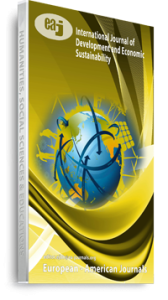The paper examined the impact of exchange rate variation on the competitiveness of Nigerian non-oil exports using the Autoregressive Distributed Lag (ARDL) model after the diagnostic tests reveal that variables were integrated of different orders. The ARDL estimation showed the presence of a long run relationship between the variables in the model. The results revealed that a 1% increase in exchange rate variation, degree of openness and bilateral exchange rate (RER) which measured the competitiveness of the nation’s exports will cause a 14.67%, 63.21% and 7.49% reductions respectively in the volume of non-oil exports in the long run. The short run dynamics revealed that the variables above exerted a negative effect on the volume of non-oil exports from Nigeria. The GDP showed positive impacts on the volume of trade both in the short and long run. The study therefore recommended the vigorous pursuance of exchange rate stabilization policies in order to minimize variation in rates and improve the competitiveness of the nation’s non-oil exports as well as the imposition of slight restrictions on non-capital imports and consumables to reduce the effect of openness on the Economy.
Keywords: Autoregressive Distributed Lag Model, Degree of Openness and Economic Growth, Exchange Rate Variation, Non-Oil Exports

